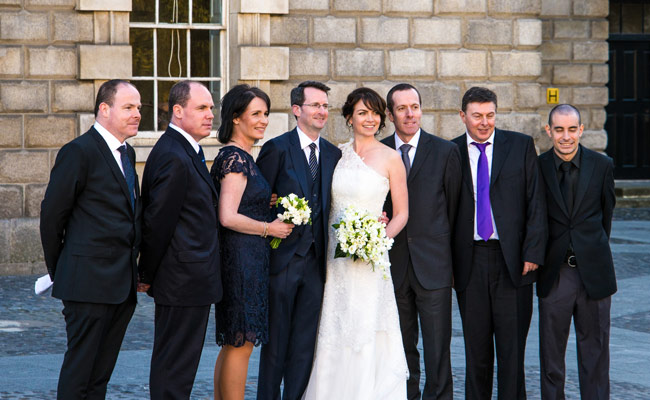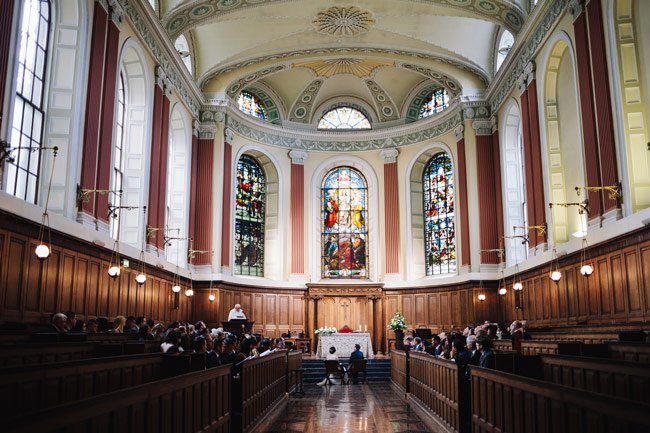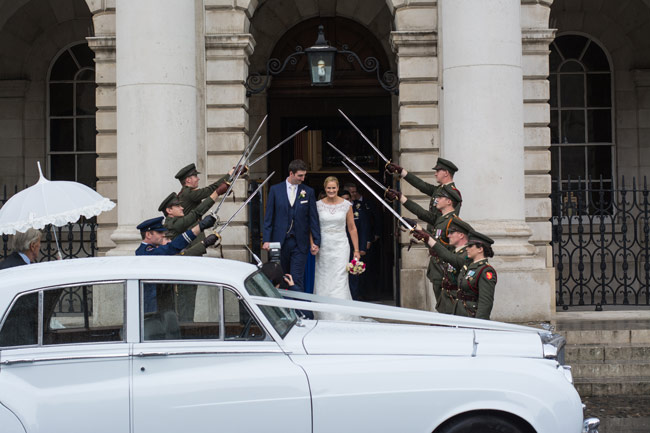November 12th, 2016 is bright and cold. Tourists take photos while students wander across Front Square to the library. Music floats from the College Chapel, as the final preparations are made for a busy day of wedding celebrations. All the planning such as finding the venue, sending out invitations, checking out Winnie Couture franchise opportunities to find the dress of your dreams and choosing bridesmaids all finally pay off as the big day finally arrives! The first wedding of the day is that of Denise Burns and Ian Constantine. Burns wears a beautifully embroidered dress while Constantine sports a suit with a yellow tie that shines brightly in the winter sun. A white and red rose is attached to his lapel that mirrors the white and red roses attached to Burns’s bag. Speaking to The University Times, her sister and bridesmaid, Veronica Burns, explains that the bride didn’t want a big bouquet and instead opted for this simple option. Around her neck is a cameo that used to belong to her mother.
The bride and groom mill around the crowd before the wedding starts, chatting to those who have made the journey to celebrate their commitment to each other. One of Constantine’s close friends remarks that their “headlong youthful rush into matrimony” was long overdue. Originally from Australia, it was a whirlwind weekend for Burns, as she received her Doctores in Philosophia from the School of Education on Friday and celebrated with a wedding on Saturday. Her sister, wearing a long, silky, rust-coloured dress explains how Burns broke the news. “She rang me up in Australia and said: ‘I’m not having a party [to celebrate her doctorate]’, and I said: ‘oh well that’s alright’, and she said: ‘I’m having a wedding instead.'” The wedding party was small with everyone gathering on the steps for a group photo. It was very clear that everyone had dressed for the occasion and perhaps even visited the mother of the bride shop Darlington to make sure they were dressed appropriately. Afters were being held in the Hilton Hotel, and everyone stood around chatting excitedly waiting for the photos to finish before departing for a night of celebration.
the Church of Ireland chapel was officially made available to other Christian denominations in 1973 by the then-Church of Ireland Archbishop of Dublin
Standing in Front Square, the Church of Ireland chapel was officially made available to other Christian denominations in 1973 by the then-Church of Ireland Archbishop of Dublin. The two main groups that frequently use the chapel are Anglicans and Roman Catholics. The building is designed following the old-style of Anglican chapels, with the pews facing each other rather than the Roman Catholic-style of facing the alter. An organ towers on the balcony while magnificent stained glass windows shine down on all those who enter. The chapel is only open to Christian weddings, but the College does provide for humanist and non-denominational weddings in the equally beautiful Exam Hall that stands directly opposite, reflecting the diversity of people that Trinity caters for.
To get married in Trinity’s chapel, one partner has to be a student or a member of staff or have graduated from the College within the past 12 years. Speaking to The University Times, Peter Sexton, one of Trinity’s Catholic chaplains and the person responsible for ensuring these weddings occur, explains that “not many students get married while they’re here, but some members of staff do”. Once this criteria has been fulfilled, the couple receive an application form and information surrounding getting married in the chapel.The chapel then sends out a set of three dates to the couple from which they can choose. There are strict guidelines as to when weddings can take place on College grounds because, after all, and as Sexton explains, “it is a university”. Couples can therefore be married at 11.30am or 2pm on any Saturday throughout the year apart from the month of July, as the College is then officially closed to ceremonies. The only exception is the month of August when you can get married on any day you please as the “university isn’t functioning”. This is apart from Sundays, of course, which is a day traditionally seen as disrespectful to get married on.

The couple then comes to Trinity where they are able to see the church, and Sexton is able to ensure that they are aware of what they are undertaking. If the couple is Catholic, they also have to go to their local priest and complete a pre-nuptial course. The chapel requests six months advance notice of the wedding to ensure that all the steps are followed adequately. Sexton admits that getting married here “isn’t everyone’s cup of tea because it’s an Anglican chapel in the old style”. Once the technicalities have been dealt with, all that is left is for the marriage to go ahead. Generally, graduate couples are required to find their own solemniser, but students and those currently employed by the College do have the right to ask one of the chaplains to perform the ceremony. “People ask a friend who is a priest or some connection with their family”, says Sexton.
So, who are the people who get married in Trinity? Wander around campus for long enough on a Saturday, and you may catch a glimpse of a wedding party hobbling over the cobbles. Tony Devoy, a member of Trinity’s security and the man responsible for ensuring that people don’t wander in and interrupt the ceremonies, remembers one year when Front Square was completely dug up to facilitate maintenance to the cobbles. The fences and general construction work forced couples to cross the square and take photos in front of the Exam Hall instead. The fact that the College has priorities other than the weddings can prove a challenge for couples, with Devoy remarking that College is “always changing the goalposts” and that often people are unaware of what else might be happening in College on their special day.
There are audible whispers as people admire her long, beaded gown and simple white and peach bouquet
As the photos for the first wedding wraps up, the second wedding party begins to arrive. The age dynamic of this crowd is notably different, with bright suits and skyscraper heels floating into the chapel. David Malone and Ciara Howard met while studying in England, but Malone graduated from Trinity within the past 12 years, making them eligible to be married here. Speaking to The University Times, before all the madness began, Malone explained that the reason they chose Trinity was “the setting”. Flanked by his two groomsmen, Malone is all smiles and admits he’s had “no nerves yet”. One of the groomsmen presents a little box that holds the all-important ring. “You know there’s supposed to be two of those?”, jokes Malone, as the groomsman pretends to nervously search for the other one. The atmosphere surrounding this wedding is one of excitement. People mill around waiting for the bride to make her entrance. The mother of the bride and two bridesmaids pull up in a silver-grey 1954 Rolls Bentley. The car quickly turns around to collect the bride from the Shelbourne Hotel, where the wedding party has spent the morning getting ready. The wedding photographer walks around catching people before the ceremony begins. Devoy’s radio crackles with a simple “the bride is on her way”. Moments later, the car pulls up again and out steps Howard. At this stage, a large crowd has gathered outside the chapel, and there are audible whispers as people admire her long, beaded gown and simple white and peach bouquet. As she enters the chapel, the tourists begin to disperse yet are no doubt enthralled by the magic of it all.
Every person that gets married in Trinity seems to have a different reason for doing so. Prof Patrick Geoghegan, who lectures in the Department of History, married his wife Olivia Waters in the Trinity chapel late last year. Speaking to The University Times, Prof Geoghegan explains that it wasn’t always their plan to have the wedding in Trinity: “Our original plan was maybe to go to Rome or get married outside of the country because we were thinking let’s have a small wedding.” The more they considered this option, however, the more apparent it became that this wasn’t going to work: “We thought, well, we’re putting everyone to a huge expense having to travel, and then we had to travel and scout out the venues and then we thought, well, what about Trinity?”. Waters had graduated from Trinity, and both continue to work here, so it seemed like the perfect option. The ceremony was performed by Fr Dermot Fenlon, a “distinguished historian” and now a “good friend” of the couple, with music provided by organist Cillian Long and Trinity’s chapel choir. “Cillian was absolutely fantastic”, explains Geoghegan. “I had some ideas, and I wanted the Wagner opening, you know, the here comes the bride bit. But it’s from Lohengrin, so I said: ‘Could you do it with the German with the actual singing from the opera?'”. Along with the chapel choir conductor, Andrew Burrows, the group were able to pull it off, and Geoghegan admits the result was “absolutely brilliant”.

Geoghegan believes the fact it was in Trinity and students were involved made it more special, stating his belief that “there was a certain amount of luck in it all”. The couple didn’t want speeches but asked close friend, the now-late Supreme Court judge Adrian Hardiman, to give a toast. Unfortunately, Hardiman passed away six months later. “If we had postponed the wedding or the wedding had been a bit longer like he would have missed it, and the whole thing would have been very different, you know? Our timing just worked out”, says Geoghegan.
It wasn’t just the chapel that played an important role in Geoghegan and Waters wedding, with much of the day being held on campus. The reception was held in the Dining Hall with part of the afters in the Atrium. The wedding party then headed onto Lillies Bordello to dance the night away. “We had a lot of relatives that were from America and England and everywhere, and when they saw the chapel they were just blown away by it”, he explains. Waters used to work with a woman in the accommodation service in Trinity, and she provided the flowers for the wedding, and they also managed to secure some time in the Long Room to take photos because of their connection with the College. “I think it’s nice to have that connection”, Geoghegan remarks. “I think if we had gone away somewhere else, we wouldn’t have had that connection with the place, and it didn’t feel like Trinity on the day. It didn’t feel like we were at the place where you work. It felt like you know a different place. So I think that was great as well.”
I looked, and there was all these people gathered around the car taking photos of me, and I felt like the queen
Another couple whose connection to Trinity led them to being married here was Kim and Chris Fitzpatrick. Chris had completed his master’s degree in management of information systems in Trinity. He decided to propose to longtime girlfriend, Kim, on the day of his graduation. Speaking to The University Times, Kim explains how he popped the question: “His mam and dad had left, and he was like, ‘do you want to go for a walk around the grounds?’. And I was like, yeah, because we’d often drop into Trinity if we were around town or anything. And then I kind of walked ahead of him, and I looked around and he was on one knee.” The couple wanted “something with meaning behind it” and felt like Trinity was the perfect place. Married on August 5th, 2016, their 10th anniversary, “the sun was splitting the skies” as the wedding party arrived into Trinity. “I was actually early for the church, and all the lads were in the pub across the road, so I had to sit in the car round the corner in the grounds of Trinity and wait for them all to leave the pub and get back into the church”, laughs Kim. While waiting for the groom to return, however, she drew a curious crowd of tourists, which continued to build: “I looked, and there was all these people gathered around the car taking photos of me, and I felt like the queen.”
Nothing could have prepared her, however, for the crowd that had gathered outside the church: “We kind of got the nod to go round the corner to where the church was, and it was crazy. Like I’d say there was roughly about 300 people outside, and I kind of got a fright because I said: ‘Oh nobody is inside, nobody is in the church’, and then I went ‘oh I actually don’t know any of these people.’ It was crazy.” It was at this moment that the nerves kicked in and Kim’s legs “turned to jelly”. Once she was inside the church, however, the crowd outside melted away. When they returned to Front Square after the ceremony, the crowd had thinned, but several people approached the wedding party looking for photos and enquiring about the day with the photographer having to photoshop several non-wedding goers out of some of her shots. “Everyone was in the limelight”, says Kim with a laugh.
The couple did have some practical worries such as parking and, for the bride, how the women attending the wedding would deal with the cobblestones: “The girls walking on the cobbles with their heels, that entered my head. I wasn’t even thinking about myself.” The whole affair passed smoothly, however, with Kim saying: “I love it because it’s a different memory from other people’s weddings. I know obviously your own wedding is more special, but it kind of stood out a lot for us then because of the crowd and everything.”
The magic of Trinity doesn’t escape many people. For these couples, however, their memories of Trinity go a step beyond the average person’s. Geoghegan admits that it’s hard to put a value on the experience of having your wedding on the College grounds: “If you were an American celebrity or something, and you wanted to organise that, it would cost an absolute fortune. A venue, you know, a university founded in 1592. Like these incredibly old buildings, the sense of history. You know, it’s a priceless kind of thing that all students and graduates and staff can avail of.”







